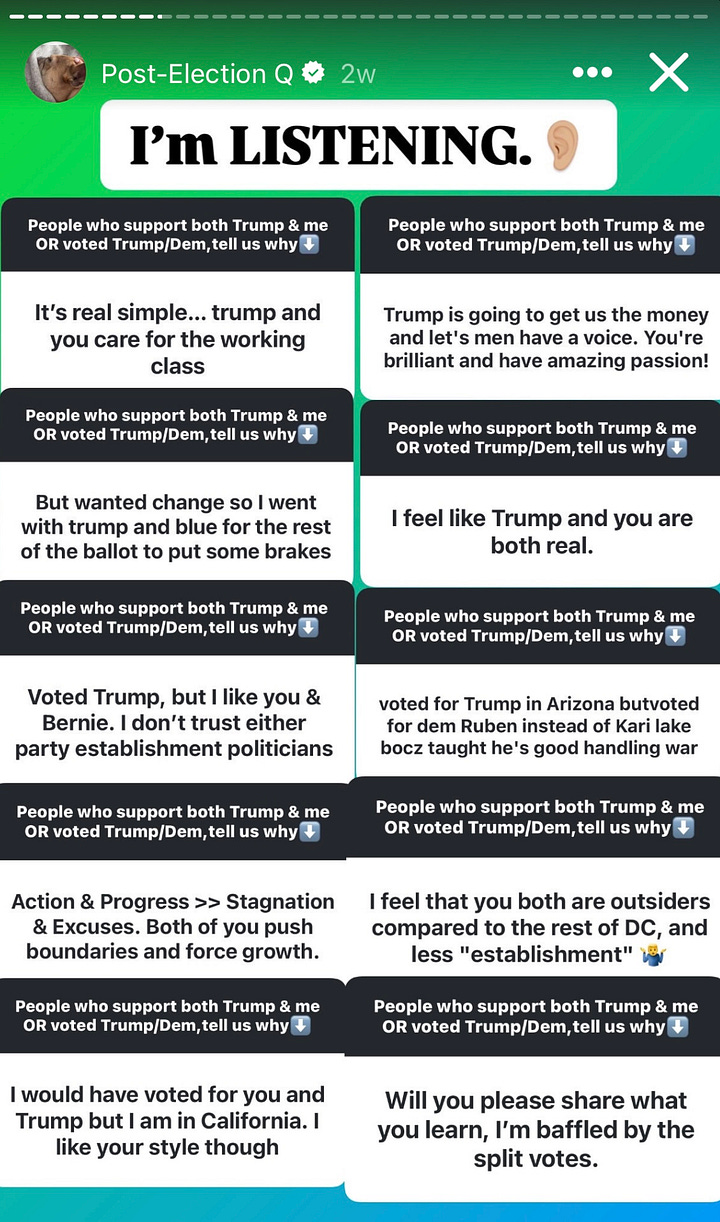Are Democrats too liberal? Or too conservative?
We're asking the wrong questions.
In the United States, the Democratic Party has long been the party of public welfare. It was meant to ensure that the economy thrived, that people remained employed, that we had social safety nets in place when people lost their jobs or retired, that our children received a good education, and that we have access to good healthcare when we have an accident or get sick.
These are popular ideals but, for the first time in 20 years, the Democratic candidate lost the popular vote in the US presidential election and every post-mortem notes the same reasons why: Either Democrats slid too far to the right, favoring oil and gas production, criminal justice support, and foreign conflict support, alienating their social welfare mission; or Democrats slid too far to the left, making everything about race and gender, letting illegal immigrants flood into our country, and allowing homeless populations to take over our cities and parks, while favoring policies that benefit the few over the many.
I think: Everyone cares way too much whether Democrats are on the “right” or the “left,” and that is the problem. Democrats should be focused on social welfare—on the good of all citizens in this country. How “right” or “left” they seem while achieving that is completely antithetical to the goal.
For example: Many would very much love to make our cities and our public parks nice places to live again. Public spaces are a strong Democratic ideal and almost no one wants homeless people to be living in our parks. But fringe groups to the left are a loud and vocal group online ready to call anyone out for grievances against the disadvantaged. For a politician to admit they want to police public parks and close them at night (as many European countries do) is to call the left down on them as being anti-homeless.
This has caused Democrats to become “audience captured” by their party. No one wants to be seen as anti-homeless, or anti-anything. This is the party of the people, and that means protecting everyone! But in being afraid to suggest solutions that might seem too “right,” like removing homeless people from parks or building gates around them (also as the Europeans do) we create a worse situation for everyone. The parks are given over to the homeless, and the homeless remain unable to afford a home and are forced to live in parks. The problem compounds.
A more pro-social approach would be to build a lot more housing units so that there is more supply, less demand, and thus homes go down in price and become more affordable for all. In Tokyo, one Japanese developer has built hundreds of microunit buildings, each containing 95-square-foot apartments (called three-tatami rooms) that fit only a lofted bed with a small living room, bathroom, and kitchenette. These tiny rooms rent for between $340 and $630 a month, making them accessible to nearly anyone with so much as a part-time job. A teenager who was forced to move out of her parents home was able to afford her own place without resorting to homelessness. Two-thirds of the buildings are rented by residents in their 20s earning between $17,000 and $20,000 a year.

These buildings provide “affordable housing,” but not because they are publicly funded and subsidized. The developer, Spilytus, says microunits rent for twice the price-per-square-meter of a one-bedroom apartment, making them more profitable to build. Because they can fit more units in each building, developers earn a 7% yield for microunit buildings compared to a 4% to 5% yield for traditional apartment buildings, even as renters get smaller, more affordable housing. We create a pro-business and pro-social approach to housing. It’s a win-win!
If this seems like a common sense idea, it is! All we’d need to do is cut through some regulatory red tape (most US cities have “minimum size” requirements and “density limits,” among other barriers to entry), and developers in the US would be enticed to build microunit buildings in every major city. As homelessness directly tracks with home prices, the addition of affordable units to the market would significantly reduce the homeless problem in our cities. All of us would be able to afford a place to live, and all of us would be able to enjoy clean and safe public parks and libraries during our leisure time.
A working social party should push these kinds of common sense ideas forward, but it has become too afraid of the left, of looking like they are anti-homeless, to actually solve the problem overall. And it has become too afraid of seeming too right to recommend a pro-business and deregulation strategy as the method of solving it. The Democratic Party can only resort to using tax dollars to pay for subsidized housing which doesn’t actually solve the problem, and instead perpetuates homelessness forever because homes never become affordable enough for people to be able to pay for them themselves.
Social media exacerbates this effect. Imagine the optics of a police officer escorting a homeless person out of the park or a developer spending millions to turn a historical building into an apartment complex. Even if doing these things will result in better living conditions for the homeless, affordable housing for everyone, and clean and safe public parks for all of us to enjoy, one social media post videoing these events could create a chorus of “defund the police” and “protect the unhoused,” at the same time as they produce a counter response of “fund the police” and “protect our families,” completely derailing the process. We can see these kinds of culture wars all over TikTok already with little context to explain them.
This has affected decision making across the board: Democratic politicians are too focused on being seen as pro-immigration to realize that we should be building pathways for legal immigration, not propping up illegal immigration. They’re too focused on being seen as pro-environment to recognize that only nuclear power can significantly replace fossil fuels. And they’re so focused on being pro-worker that they allowed the longshoremen to hold our ports hostage, demanding higher pay for already highly paid individuals while limiting automation. The net result, as Tomas Pueyo points out, is that none of the 50 most efficient ports in the world are American, Shanghai’s fully automated port moves nearly as many containers as all of the US ports combined, and because our ports are so slow and focused on doing everything manually, anything that has to ship across the seas will become more exorbitantly expensive for the average American worker. Exactly the person unions are supposed to protect!
For a party that is supposed to be focused on social welfare, the Democratic Party has started acting against social welfare because it’s too afraid of the optics, allowing audiences who think candidates are being too right or too left to hijack good ideas the vast majority of American voters want. This is ridiculous. No one walks to work in the morning thinking “I want San Francisco to be more conservative” or “I want San Francisco to be more liberal.” Rather, they wish there was a better solution for the homeless problem when they walk their kids to school in the morning.
Our politics divide us, but our needs unite us. Democrats should be focused on solving our needs, not caring which side they cater to to do it.
And Democrats should feel emboldened to stand firm in these principles now more than ever. Donald Trump won because he said everything he thought and felt even if it was wrong and everyone thought that was better, while Kamala Harris said very little about what she thought and felt because she was afraid that it might be wrong and everyone thought that was worse. We can’t be so afraid of the optics that we aren’t solving the problems, and I think this election proved that politicians who don’t care about the optics and actually say what they want to do to help the country are much more popular than the ones who do. It was wild to me that Bernie Sanders was one of very few politicians that openly expressed any kind of opinion on our geopolitics leading up to the election.
This is why we saw people voting for both Donald Trump and Democratic congresswoman Alexandria Ocasio-Cortez, who are both openly angry at the system and want to make drastic changes to it even if they are angry for different reasons and have very different ways they’d like to solve it. When AOC polled her followers on Instagram to ask why they voted for a split ticket, they said things like “I feel like Trump and you are both real,” “both of you push boundaries and force growth,” “voted Trump, but I like you and Bernie. I don’t trust either party establishment politicians,” and “you are focused on the real issues people care about.”


This is telling.
Our takeaway shouldn't be that we need to reform the Democratic Party to be more left or more right, but that we need to reform the Democratic Party to being the social party—the one out for the greater good of the people who live in our country and who are willing to take a stand for that. This is the party’s permission slip to stop caring about the party lines, but to care very much about solving the problems instead.
But I’d love to know your thoughts. 👇🏻
Thank you for reading and thinking with me! This is the first in a quick series on political structures in the US.




Elle this assessment is SPOT ON. As a longtime registered Dem I can barely identify with the “anti-everything” politics of the moment. Trying to lift EVERYONE without considering how to leverage existing systems that should be bipartisan (such as the ones you mentioned) is causing the moral weight of the this unofficial party platform to collapse on itself. I voted a split ticket in Ohio for the same reasons you stated, so thank you for letting me feel like I am the one being “seen”!
I love your insights on this issue. Compared to the GOP, I feel that the Dems were the only ones who proposed solutions to problems. There’s a large population of in-house people in the town across the river, and it also has several vacant hotels and motels. Why not use those for housing? And lo and behold, there’s an organization that does just that!
https://www.theguardian.com/us-news/2024/dec/02/kentucky-homeless-arthur-street-hotel-housing-first?CMP=Share_iOSApp_Other